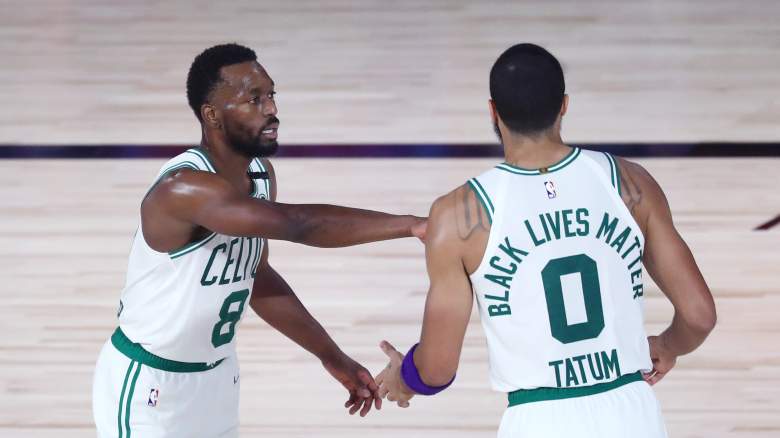
Getty Celtics star Kemba Walker, at left, encourages young star Jayson Tatum
As a former top recruit from the New York-New Jersey area and the No. 1 point guard recruit in the nation back in 1999, Jay Williams knows a few things about point guards who hail from the area. And two of the most significant in today’s NBA have had their fates intertwined with the Celtics since the raucous free-agent summer of 2019 that upended much of the league.
That was when point guard Kyrie Irving, of West Orange, N.J., bolted to the Nets after two disappointing years in Boston, and big man Al Horford surprisingly fled for Philadelphia. Those moves paved the way for the Celtics to bring in Hornets point guard Kemba Walker, who was born in the Bronx and attended Rice High School in New York.
Because Walker essentially replaced Irving in Boston, the two will forever be compared. And with a Celtics team that includes burgeoning young stars Jayson Tatum and Jaylen Brown as well as established wing Gordon Hayward, Williams said things have worked out just fine for Boston. Williams expressed that view on the Heavy on Lakers Show hosted by Brandon ‘Scoop B’ Robinson.
“The one thing about Kemba that Ky doesn’t do as well, Ky has the ball in his hands a lot,” Williams said. “The amount of time per possession that Ky has the ball in his hands is a little bit different than Kemba.”
Celtics Have Been More Efficient on Both Ends with Kemba Walker
The difference has been subtle. Irving’s numbers (23.8 points, 6.9 assists, 5.0 rebounds) were better in 2018-19 than Walker’s (20.4 points, 4.8 assists, 3.9 rebounds), with Irving a far more efficient shooter. But the Celtics have operated better on both ends of the floor this season, averaging 112.8 points per 100 possessions offensively (fourth in the NBA) and 106.5 defensively (also fourth), according to NBA stats.
Last year, with Irving, those numbers were 111.3 points per 100 possessions offensively (10th) and 107.0 defensively (sixth).
That difference, offensively at least, has stemmed from Walker’s willingness to share the ball and keep other players involved. Here’s how Williams put it:
Kemba is more willing to get the hockey assists, kick the ball forward. I think that ability to kick the ball ahead and get other people involved quicker instead of you making the play to make a play for somebody else, letting people kind of own that, I think that seeps into the culture of the Celtics. Letting Jay Tatum go do his thing instead of creating a shot for Jay Tatum. Let him create a shot for you and other people as well. I think that Kemba has always been that way, though.
Kemba Walker Has Been an Effective Leader
Of course, what Williams left unsaid is that Walker’s style has been more effective when it comes to leadership, especially among the Celtics’ young, would-be All-Stars. The quality of Irving’s leadership in Boston in 2018-19 was talked about, seemingly, to no end and he probably got more criticism for the team’s disappointing finish that year than he deserved.
But Walker, though quieter than Irving, has been a better leader, allowing the younger players more room to flourish. Last summer, when the Celtics emerged as a frontrunner to sign Walker, his coach at Connecticut, Jim Calhoun, predicted he would bolster the supporting cast.
“I think the big thing is that he makes Tatum, he makes Brown, he helps Gordon Hayward come back. He makes a lot of terrific players be exceptional players,” Calhoun told NBC Sports Boston. “There are very few guys you’re going to get in basketball — not only are they really good, but they make others better both psychologically, winning-wise — he can really pass the ball. … He’s a special talent who can make other players better.”
READ NEXT: NBA Execs Expect Celtics to Be ‘Very Active’ on Trades Ahead of NBA Draft